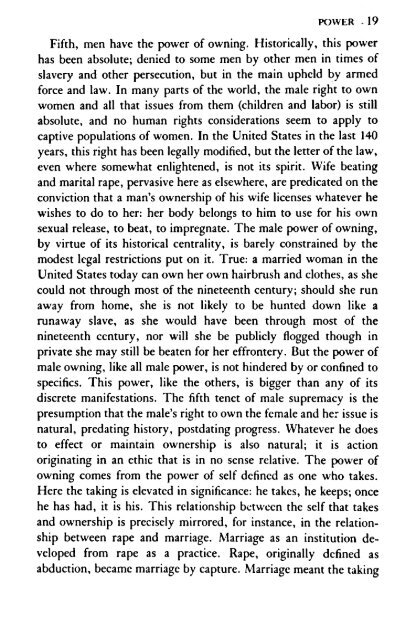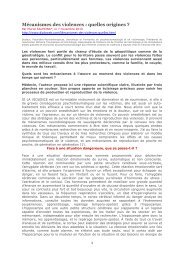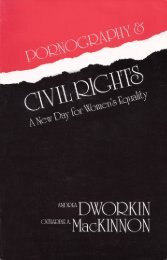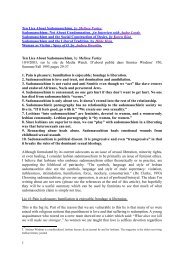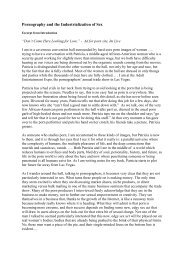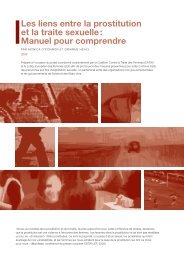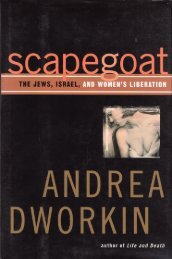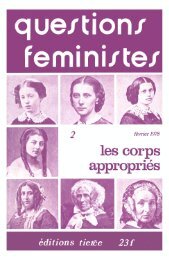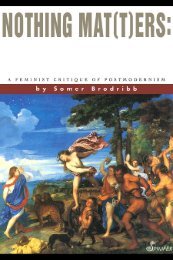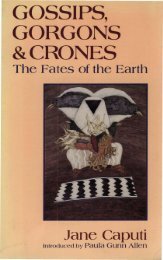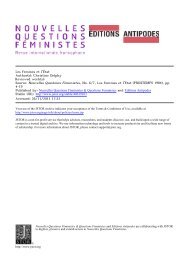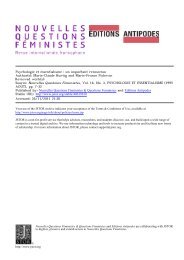- Page 5 and 6: P L U M EP u b l i s h e d b y t h
- Page 7 and 8: F or Jo h n S toltenbergIn M em ory
- Page 9 and 10: C o n t e n t sIntroductionxiiiPref
- Page 11 and 12: sires; and I appealed to them, whet
- Page 13 and 14: who has been bought and sold. She m
- Page 15 and 16: esist; they disappear when the dang
- Page 17: When he arrived, he informed me tha
- Page 21 and 22: mom’s. [He came after her with a
- Page 23 and 24: word to make it denote a story, pro
- Page 25 and 26: T he burden of proof will be on tho
- Page 27 and 28: new social truth emerged, one that
- Page 29 and 30: “we”? What is the “freedom
- Page 31 and 32: is mine, ” Therese Stanton wrote
- Page 33 and 34: who were the same, never of those w
- Page 35 and 36: the pictures. Instead, some of us u
- Page 37 and 38: us—let us be dumb and die. ”181
- Page 39: eciprocity, whereas pornography inv
- Page 42 and 43: or scrutiny, that there is an equat
- Page 44 and 45: culture, though it is smothered in
- Page 48 and 49: was to extend in time, to be not on
- Page 50 and 51: adult, impervious to the ambivalenc
- Page 52 and 53: culture, he is a giant, enlarged by
- Page 54 and 55: the dead center of the car hood and
- Page 56 and 57: hunter, think of seals clubbed to d
- Page 58 and 59: in the larger culture, also indicat
- Page 60 and 61: eventually come from the shower. Th
- Page 62 and 63: limited framework of male sexual va
- Page 64 and 65: the greatest and best test of mascu
- Page 66 and 67: another female’s cunt. ” The hu
- Page 68 and 69: studio. Narrator wonders whether he
- Page 70 and 71: sleep. Rod wakes to find Larry assf
- Page 72 and 73: Lesbians are in each vignette. In t
- Page 74 and 75: distinctly pinkish. One of her hand
- Page 76 and 77: Men and BoysJust so docs Miller ret
- Page 78 and 79: The boy will be a witness as the fa
- Page 80 and 81: Body, philosopher Norman O. Brown,
- Page 82 and 83: penis signifies humanity. Though th
- Page 84 and 85: Throughout male culture, the penis
- Page 86 and 87: aggression of the aggressor and use
- Page 88 and 89: does not exist; rape of the sacred
- Page 90 and 91: male who cannot change his devalued
- Page 92 and 93: Male perceptions of women are askew
- Page 94 and 95: The solution, as Dinnerstein sees i
- Page 96 and 97:
other century. There are only the o
- Page 98 and 99:
3The Marquis de Sade ( 1 7 4 0 —1
- Page 100 and 101:
most of the women and girls he abus
- Page 102 and 103:
Sade took Keller to his private hou
- Page 104 and 105:
another order was issued for his ar
- Page 106 and 107:
sporadically). O n Sade’s release
- Page 108 and 109:
perhaps fourteen years old, essenti
- Page 110 and 111:
With his usual perception about him
- Page 112 and 113:
power of the biographers to define
- Page 114 and 115:
esistance from “puritanical” or
- Page 116 and 117:
had the authority to spend her mone
- Page 118 and 119:
degree, is authentic because a man
- Page 120 and 121:
collection of Sade’s work, point
- Page 122 and 123:
sexuality. The shared victim result
- Page 124 and 125:
Sade himself, in a footnote to Juli
- Page 126 and 127:
A daughter’s turning on her mothe
- Page 128 and 129:
Sade’s work in exciting the imagi
- Page 130 and 131:
is movable property— cattle, wive
- Page 132 and 133:
The whole world outside man himself
- Page 134 and 135:
image of her while being an externa
- Page 136 and 137:
falling off a log for her. It is ea
- Page 138 and 139:
leave her alone. The moment we leav
- Page 140 and 141:
Brain is absolutely clear that “[
- Page 142 and 143:
sterile word for the phenomenon tha
- Page 144 and 145:
significantly determine the quality
- Page 146 and 147:
in the realm of female beauty, the
- Page 148 and 149:
The prostitute is seen as the antit
- Page 150 and 151:
ment. It can also be seen as the cu
- Page 152 and 153:
in other words, ” writes Becker,
- Page 154 and 155:
Ullerstam, in The Erotic Minorities
- Page 156 and 157:
Mother, whore, beauty, abomination,
- Page 158 and 159:
own. H er race is ambiguous. From h
- Page 160 and 161:
weapon in her hand. Still, the olde
- Page 162 and 163:
W ith both the male and the female,
- Page 164 and 165:
is propaganda, whether used for soc
- Page 166 and 167:
it that way. ” ’7 The weak are
- Page 168 and 169:
means that it also generates incred
- Page 170 and 171:
the poisonous materials which are u
- Page 172 and 173:
Willy linked the experience of blac
- Page 174 and 175:
This cautious statement avoids the
- Page 176 and 177:
are not really distinct because the
- Page 178 and 179:
maintained; otherwise— especially
- Page 180 and 181:
variable. It is determined more by
- Page 182 and 183:
aised slightly off the floor. The p
- Page 184 and 185:
ut she belongs to the Anglo boyfrie
- Page 186 and 187:
something important for his complic
- Page 188 and 189:
value to possession of the woman. T
- Page 190 and 191:
confusing. She is without purpose.
- Page 192 and 193:
sex. Force is sex. The woman who wa
- Page 194 and 195:
United States, expressed the weary
- Page 196 and 197:
head. They parked near the corpse a
- Page 198 and 199:
made her lock herself in the wardro
- Page 200 and 201:
her robe or back or head while he w
- Page 202 and 203:
sat him in a wooden armchair. Simon
- Page 204 and 205:
among intellectuals: he writes of h
- Page 206 and 207:
ing, or even alerting, conscience.
- Page 208 and 209:
followers conclude that women have
- Page 210 and 211:
y the human female never matched hi
- Page 212 and 213:
programs for combating what is call
- Page 214 and 215:
obvious sort of commercialized pros
- Page 216 and 217:
When the mates discover them in coi
- Page 218 and 219:
scientists, that lip was just looki
- Page 220 and 221:
means that force was not used in co
- Page 222 and 223:
encouragement was nothing of the so
- Page 224 and 225:
vs. adults, ” the sexual act was
- Page 226 and 227:
In a study specifically of force us
- Page 228 and 229:
T he porne was the cheapest (in the
- Page 230 and 231:
the porneia as the technology widen
- Page 232 and 233:
why rape is absurd and incomprehens
- Page 234 and 235:
ecommendation that legal persecutio
- Page 236 and 237:
confined to the cultural level of a
- Page 238 and 239:
In the introduction to Black Fashio
- Page 240 and 241:
her between her black loins. She sc
- Page 242 and 243:
Robert Grey does not want to hurt h
- Page 244 and 245:
use of her sex is the use of her sk
- Page 246 and 247:
hymen [laughs] so he can’t take i
- Page 248 and 249:
enlarged uterus displaces the rest
- Page 250 and 251:
ers as whores— completes the pict
- Page 252 and 253:
And inside this system, women are p
- Page 254 and 255:
Women Against Sexist Violence in Po
- Page 256 and 257:
3. John Stoltenberg, “Eroticism a
- Page 258 and 259:
26. Gorer, Life and Ideas, p. 37.27
- Page 260 and 261:
18. Otto Weininger, Sex and Charact
- Page 262 and 263:
58. Ibid., p. 14.59. Herbert Marcus
- Page 264 and 265:
43. Ibid., p. 120.44. Ibid., p. 63.
- Page 266 and 267:
9. John Wolfenden, Report of the Co
- Page 268 and 269:
Addams, Jane. A New Conscience and
- Page 270 and 271:
Symons. New York: Albert & Charles
- Page 272 and 273:
York: W. VV. Norton & Co., 1978.Bur
- Page 274 and 275:
Cooke, Joanne; Charlotte Bunch-Week
- Page 276 and 277:
Didion, Joan. The White Album. New
- Page 278 and 279:
Fedder, Ruth. A Girl Grows Up. New
- Page 280 and 281:
Fuchs, Estelle. The Second Season:
- Page 282 and 283:
Goffman, Erving. Relations in Publi
- Page 284 and 285:
York: Random House, Vintage Books,
- Page 286 and 287:
Ivinskaya, Olga. A Captive of Time.
- Page 288 and 289:
Youth. New York: W. W. Norton & Co.
- Page 290 and 291:
Lewis, Oscar. Tbe Children of Sanch
- Page 292 and 293:
--------- . A Woman's Life. Transla
- Page 294 and 295:
Nehrich, Richard B., Jr.; Glenn I.
- Page 296 and 297:
of the Commission on Obscenity and
- Page 298 and 299:
New York: New York University Press
- Page 300 and 301:
Shiloh, Ailon, ed. Studies in Human
- Page 302 and 303:
Strindberg, August. Inferno and Fro
- Page 304 and 305:
Wald, Karen. Children of Che. Palo
- Page 306 and 307:
A r t ic l e s , I n t e r v ie w s
- Page 308 and 309:
--------- . “The Lie. ” New Wom
- Page 310 and 311:
Kristol, Irving. “T he Shadow of
- Page 312 and 313:
“Playboy Gives First Amendment Aw
- Page 314 and 315:
IndexAbortionconstraints on rights
- Page 316 and 317:
Christ, 53Civilization, as tamer of
- Page 318 and 319:
FreedomBrown’s definition of, 52a
- Page 320 and 321:
Lerner, Max, 208-9Lesbiansin / Love
- Page 322 and 323:
and women as instruments,109-13“O
- Page 324 and 325:
Women, ” 160-64Brain on, 112celeb
- Page 326 and 327:
Snuff artist, Sade as, 92Snuff film


